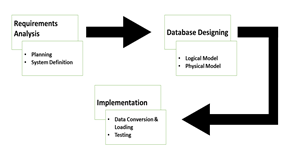Design and Development of a Comprehensive, Robust and KM-Scalable Database (Backend) for a PILI (Canarium ovatum Engl.) Information System
DOI:
https://doi.org/10.69478/JITC2020v2n2a07Keywords:
Structured Relational Database Model, MySQL, Canarium ovatum Engl., Knowledge ManagementAbstract
This paper presents the results of efforts to design and develop a comprehensive repository of knowledge for Pili (Canarium ovatum Engl.), an endemic crop in the Bicol Region known for its various uses. This study, in general, responds to the challenges entailed in the national government’s having identified “PILI” as the flagship commodity of the Bicol region. In particular, it seeks to address the dearth of accessible knowledge on the Pili industry. Enabling users around the world to become acquainted with this endemic crop. The database’s initial goal is to provide key facts on population dynamics of Pili crop (Canarium ovatum Engl.) varieties and is designed and structured towards knowledge management (KM) buildup.
Many similar information systems applied in agriculture were consulted and visited by the researchers in the literature such as the International Rice Research Institute (IRRI’s) comprehensive crop information system [1], and the more recent Mango Resource Information System [2] which was developed for the management of the phenotypic, genetic, molecular to chemical and other information on mango cultivars.
The breadth and depth of information in the database are designed to cater to the different needs of diverse groups of stakeholders (farmers, vendors, processors, scientists, researchers, policy-makers, teachers, and students). Its various applications range from basic Pili bio-ecological data management to e-commerce and analytics. This Pili database covers the more than 14 NSIC (National Seed Industry Council) accredited pili varieties, 200 accessions compiled from more than 150 references in partnership with more than 10 collaborators, and more than 500 pictures taken from different cultivars in the Bicol region.
At present, the database has 180 tables, enriched by the collection of various Pili related information ranging from its nomenclature, accession, NSIC registration, distribution, morphological characteristics, genetic resources, geo-mapping and characterization, propagation techniques, emerging diseases, growth and yield response, postharvest processing, to products, e-commerce, data analytics and other related data present in different cultivars. The database is normalized to handle complex queries needed to generate knowledge not only for Philippine Council for Agriculture, Aquatic and Natural Resources Research and Development (PCAARRD) and its member-agencies but for Pili farmers/producers, vendors, enthusiasts, retail outlets, and the market as a whole. It is designed with flexibility in mind to interface and interconnect/link with other PCAARRD systems for a dynamic web of knowledge. It is believed that making information and data on Pili publicly available will enliven and invigorate the stakeholders in this industry and help boost yield/production, encourage more research and development efforts, promote innovation, step up marketability of various pili-related products, and consequently improve the living conditions of marginalized farmers and vendors.

Downloads
Published
License
Copyright (c) 2020 John Rey S. Lirag, Ronnel R. Atole, Leo Constantine S. Bello, Rowell John B. Artiaga, Salvador V. Briones II

This work is licensed under a Creative Commons Attribution-NonCommercial 4.0 International License.



